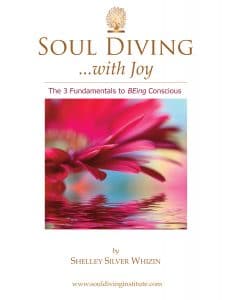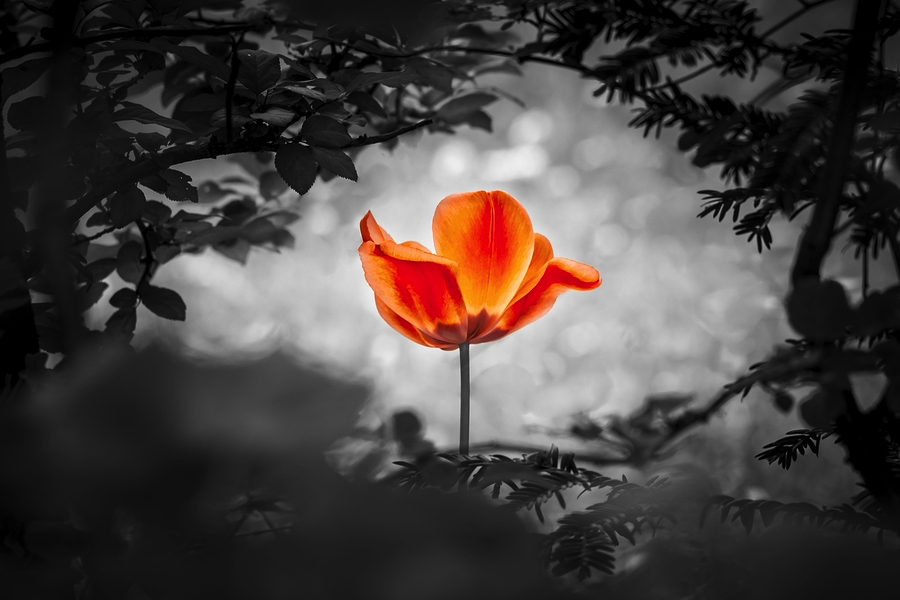
“Grief can be the garden of compassion. If you keep your heart open through everything, your pain can become your greatest ally in your life’s search for love and wisdom.”
-Rumi
There are key stages of death and dying when we are facing the loss of someone we love, we go through many emotions. What is most important during this tender time, before, during and after, is to be kind and gentle on ourselves and those around us. One experience we will go through is known as grief, a common reaction to a major loss. In this article, we will explore what grief is, how it can be expressed through the five stages of death and dying and how grief can offer a sense of healing.
One definition of grief is “a multifaceted response to loss, particularly to the loss of someone or something that has died, to which a bond or affection was formed.”[1] Another definition states, “Although conventionally focused on the emotional response to loss, grief also has physical, cognitive, behavioral, social, and philosophical dimensions.” [2]
There is no one “right” way to grieve, because everyone is different, and there is no way to anticipate exactly how the feelings of sadness, anger, loss, and loneliness will heal and resolve or even when. Grief can even be expressed in anticipated deep sorrow, caused by someone’s imminent death. Some have described the grieving process as a roller coaster, filled with highs and lows. Over time the roller coaster evens out so the highs and lows are more manageable, but the big ups and downs can reappear, especially at important family events, anniversaries, holidays or other special occasions. People who have experienced grief do say that it gets better with time and support of friends and loved ones.
Love, Loss, and Life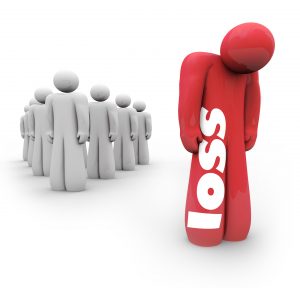
Loss is a noteworthy feeling. It can mean different things, depending on the experience. When we lose weight, we are happy, although some of us usually find it again, unfortunately. When we lose someone we love, that’s a whole other story.
The first feeling of loss occurs at the beginning of our lives when we lose our mother’s womb, feeling vulnerable when we arrive in a vast world we do not know. As we grow, we lose our toys, our friends, our teachers, our youth, our innocence, and sometimes even our childhood dreams, and we continue to experience loss in many other ways at various times, losing our houses, cars, jobs, money, relationships, and our loved ones.
Nothing in “life” is permanent. Everything is temporary, including our physical bodies. When we realize this truth, it can give us a greater appreciation for the experiences we do have, making the best of our lives, right here, right now. The interesting thing about experiencing loss is that we would not feel loss if we did not love. They go hand in hand. The interesting paradox of experiencing a lot of loss in life is that it also means we’ve experienced many blessings, as well.
When our loved ones are dying and we withhold our sense of loss from them, they know it anyway. They understand what losses they are facing. It is important to share what we feel and not pretend it is not happening, but everybody handles it in his/her own unique way.
When we experience an illness ourselves and are waiting for a prognosis, we begin to mourn the loss of our own health and the potential loss of our own life. When we await a test result, we almost lose our minds, just thinking the worst possible scenario. We may even feel that our mind loses its ability to think clearly when we are faced with such a possibility. I know for me when the doctor said to me, “You have breast cancer,” in 2003, I thought he was talking about someone else. My initial reaction was, “You talking to me?”
No two people are alike and no two people have the same experiences. Each human being is unique; however, we do have some things in common when facing loss.
Stages of Death and Dying
In the sixties, Elisabeth Kubler Ross, a Swiss American psychiatrist, was working with patients who were dying. Having an intense curiosity about what they were experiencing, she focused on the patient as a human being, to include them in dialogues, and to learn their strengths and weaknesses.[3]
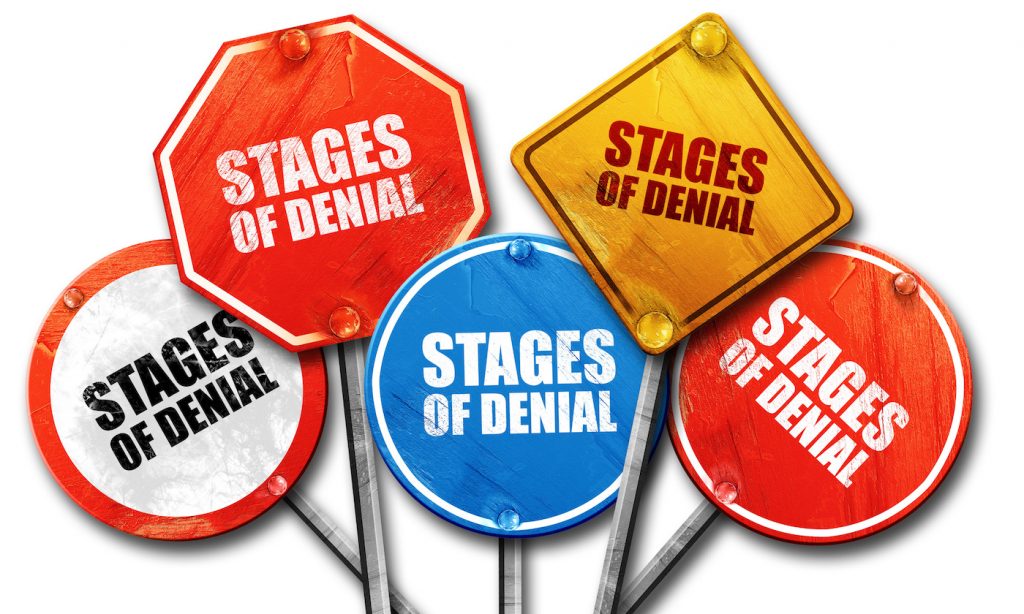
After two and a half years of working with dying patients, she interviewed 200 patients and was asked to write a book. In 1969, Ross wrote a groundbreaking book, called, On Death and Dying, that would become the foundation for understanding, what she believed to be, the five stages of death and dying: DENIAL, ANGER, BARGAINING, DEPRESSION and ACCEPTANCE (Acronym: DABDA). [4]
Ross went on to describe that each stage was an important part of our healing process from the emotional loss and that these five stages did not occur in any order, nor did they occur in every person she studied. She recognized that grief was as individual as our individual lives.
All five stages: denial, anger, bargaining, depression, and acceptance, can be applied to all losses in life. What is important to note is that whatever stage we are in is exactly what we are supposed to be feeling, whether it be feeling empty, helpless, immobilized, paralyzed, worthless, angry, sad or fearful.
I believe that there is no use in forcing anyone grieving out of or into a stage when they are not ready. And, for certain, time will heal, even though it may feel like a roller coaster ride. Loss is one of the most challenging lessons in life, but as Ross explains, “there is no growth without loss, and there is no loss without growth.” [5]
Inevitably we learn something from every loss, gaining a little bit more of who we are. Just look at the loss of a caterpillar’s life. It loses its entire body and transforms into a beautiful butterfly.
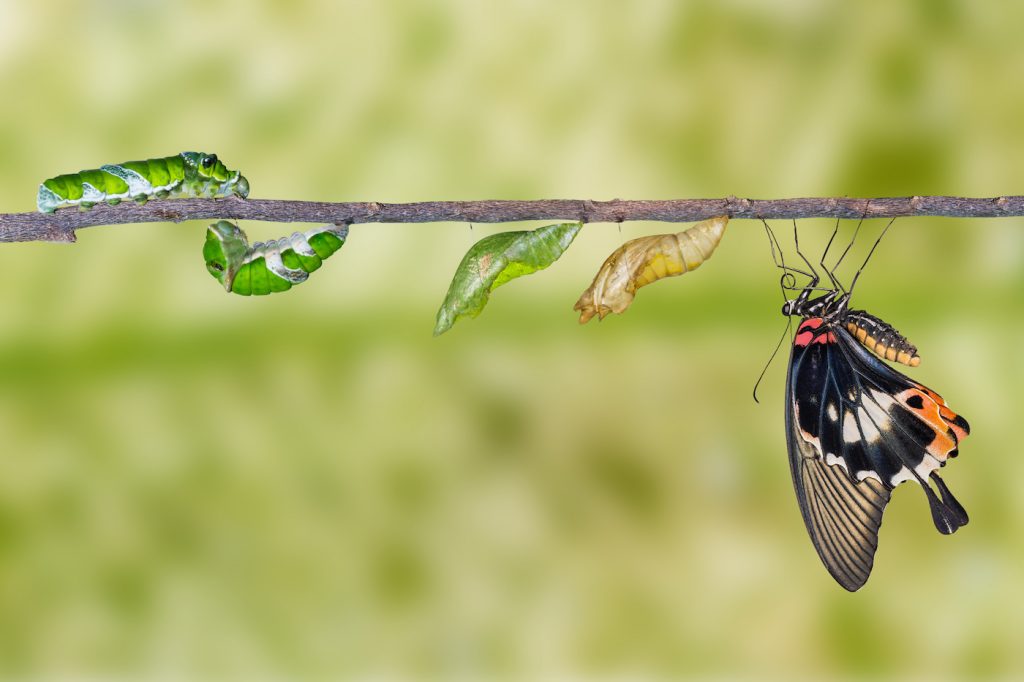
For people who have had near-death experiences, they say that death is only shedding the physical body. They remember having had a sense of wholeness in their death experience, feeling connected to everything, not experiencing a sense of loss at all, nor feeling alone. They felt supported. It is we who feel the loss of them.
Loss has a way of unifying us and helps to deepen our understanding of each other, connecting us in a way maybe no other lesson of life can. Experiencing loss effects many lives: the family, coworkers, caregivers and extended loved ones. Even the professionals feel the loss of someone they are caring for. Shared loss teaches us more compassion for one another. The only thing as challenging as loss, is wondering if there is going to be a loss. Sometimes we live in limbo, and being in that place of possible loss is itself a loss.
I think the important thing to know is that even though we may not get back the loss, it is possible to heal from the loss, with time. Loss is probably one of the most challenging lessons in life because it is attached to love. If we didn’t love, we wouldn’t feel loss. Remember the statement by Alfred Lord Tennyson who said, “”Tis better to have loved and lost, than to never have loved at all?”
Feeling Guilty
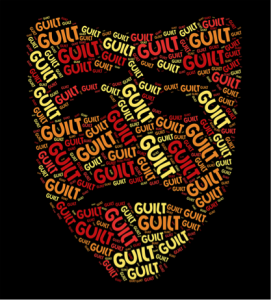 When a loved one is dying, feelings of guilt can arise when we don’t express our feelings of potential loss, thinking we don’t have the right to be paid attention to, since our loved one is the one who is dying. Sometimes we initially experience denial and thus we may not feel a sense of loss at the time but may feel it at another time, when something out of the blue will trigger the loss.
When a loved one is dying, feelings of guilt can arise when we don’t express our feelings of potential loss, thinking we don’t have the right to be paid attention to, since our loved one is the one who is dying. Sometimes we initially experience denial and thus we may not feel a sense of loss at the time but may feel it at another time, when something out of the blue will trigger the loss.
Sometimes we get conflicted with the loss of loved ones, especially if we didn’t have a great relationship with them in the first place. We mourn for those who cared for us, and for those who did not give us the love we deserved. What is important is to feel the loss and take time to mourn and to acknowledge that those losses cannot be negated, even if we think the person did not deserve our love. What is important to remember is that we all heal in our own time and in our own way. Healing continues to happen.
Sometimes we react to the hurt we feel from the loss, detaching, rescuing others, helping them with their hurts, so we don’t have to feel ours, becoming so self-sufficient, we don’t “need” anyone. We abandon ourselves and don’t let anyone see our loneliness. On some level, we do this so we can heal. Sometimes we create loss by guarding against loss. We keep people at a distance, and that is a loss in and of itself.
Loss is often an initiation into adulthood, a rite of passage, so to speak. We walk through the fire to the other side and somehow, we are changed, something new happens. And the only way out of the pain is through the pain. As in the oceans of life, the tide comes in and goes out, just like our emotions. So, how, you may ask, is BEing© [6] conscious of grief a gift and healing way to the heart?
What are the Stages of Death and Dying?
By identifying grieving through these stages within ourselves, we can see that they are coping mechanisms to learn how to live with the reality of losing the one we loved. They serve as tools to help us frame and identify what we may be feeling and gives us an opportunity to notice where we are in the process.
The stage of DENIAL helps us to survive the loss, when the world becomes seemingly meaningless and overwhelming when life makes no sense. Sometimes, our initial reaction is a state of shock and denial. It’s our mind’s way of shutting down the overwhelming pain, allowing us to go numb and not feel, even wondering how we can go on, and if we do go on, why we should go on. It’s like a grace period… nature’s way of letting in as much as we can handle.
Once you accept the reality of the loss and begin to ask yourself questions, you are unknowingly beginning the healing process, which is a way to the heart. You become stronger and the denial begins to fade, and all your feelings begin to surface.
ANGER is an emotion that stirs up everything. We want to blame someone, anyone, even the person who has left us. Anger is a necessary stage in the healing process as well. So, it’s important to allow yourself to feel your anger, even though sometimes it may seem endless. But the more you truly feel it, and not judge it, the more it will begin to dissipate and the more you will heal.
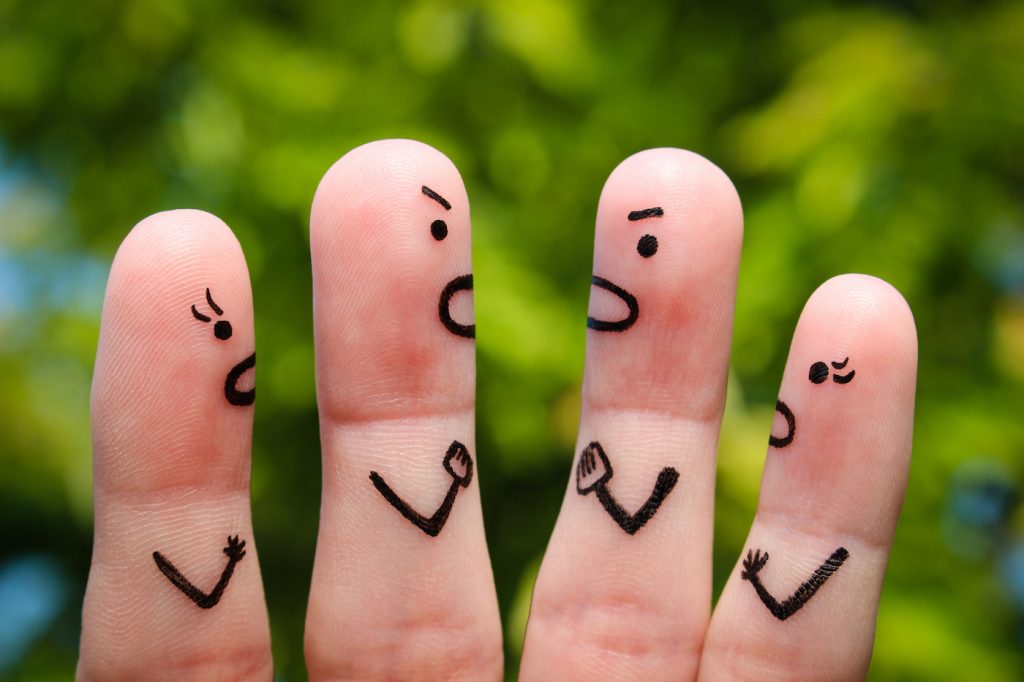
Anger may be the tip of many other emotions that lie underneath, which will surface in their own time. Anger can sometimes feel as if it has no limits…and can be extended to everyone involved, including God, (if you believe in God) asking, “Where is God in this?” Be assured that this is a normal response and that it can even become a bridge and a connection made from strength, something to hold onto that feels better than nothing. Anger could also come up because your relationship with the individual who is dying was not what you wanted, or maybe someone had dementia and didn’t have the ability to converse.

Sometimes, before your loved one dies, you may find yourself in another stage called, BARGAINING. You may even find yourself bargaining with God (again, if that is your belief). “Please God, I will never be angry at my wife or husband (or loved one) again, if you will just let her or him live.” Perhaps some other belief systems accept things as they are, however, you may find yourself wishing it was a bad dream and if you woke up it would be different.
In this phase, we become lost in a maze of “If only…” or “What if…” statements. We want life to be the same as it was so much, and our loved one healthy and happy again. We want to go back and stop the hands of time to do whatever was needed to avoid that illness or prevent that accident from happening.
Unfortunately, guilt is often bargaining’s companion. We begin to find fault in ourselves, and what we “think” we could have done differently. We even want to bargain the pain away that feels like it will last forever. These stages ebb and flow and ebb and flow.
Once we realize that bargaining is not working, our attention moves to the present and we feel empty, and grief seems to enter our lives on even a deeper level, deeper than we have ever imagined and this DEPRESSIVE stage feels as though it will last forever.
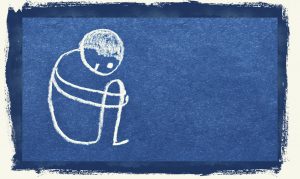 What’s important to recognize in this stage is that this feeling of DEPRESSION may well be a temporary situation and is an appropriate response to a great loss. During this stage, we may even withdraw from life, left in a fog of intense sadness, wondering if there is any point to going on alone? And, judgment can creep in here too, making us think we should just snap out of it, that there is something wrong with us, that we need to be fixed. We say to ourselves, “I should be over it by now,” or worse yet, others say the same thing. There is never really getting over a loved one dying. It’s carrying on with life as much as possible. Realizing that your loved one is not coming back is understandably depressing, and another necessary healing step along the way.
What’s important to recognize in this stage is that this feeling of DEPRESSION may well be a temporary situation and is an appropriate response to a great loss. During this stage, we may even withdraw from life, left in a fog of intense sadness, wondering if there is any point to going on alone? And, judgment can creep in here too, making us think we should just snap out of it, that there is something wrong with us, that we need to be fixed. We say to ourselves, “I should be over it by now,” or worse yet, others say the same thing. There is never really getting over a loved one dying. It’s carrying on with life as much as possible. Realizing that your loved one is not coming back is understandably depressing, and another necessary healing step along the way.
ACCEPTANCE is sometimes misinterpreted with the notion of giving up and being “OK” with what has happened. Most people don’t feel OK or all right about the loss of a loved one, but this stage is about the reality that our loved one is physically going or is gone, and life will never be the same. Even though we may not like this new reality, we eventually accept it and learn to live with it. It becomes the new norm.
At first, many people want to maintain life as it was before a loved one died, and as time passes, we learn to reorganize roles, reestablish our identities and find out who we are without them.
Think of a mobile, hanging in perfect balance, with all the pieces of the mobile in their positions. Take one piece away, and what happens?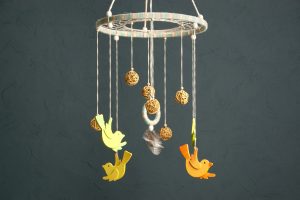 The mobile scurries to find a new balance without the piece that is missing. Every piece in the mobile must vie for a new position, a new way of being, because that one piece that balanced everything out is gone.
The mobile scurries to find a new balance without the piece that is missing. Every piece in the mobile must vie for a new position, a new way of being, because that one piece that balanced everything out is gone.
The tricky part is paying attention to your thoughts. Keeping gentle with yourself helps to calm down the chatter about being disloyal if you are having more good days than bad ones. As you begin to live again and enjoy your life, on some level you may be thinking that you are betraying your loved one by feeling happy.
Although you can never replace the one you lost, you can make new connections, new meaningful relationships, new inter-dependencies. You begin to listen to your needs. You recognize it is time to move, to change, to grow, to evolve, and even reach out to others and become involved in their lives. You eventually begin to live again and have given grief its healing time, whatever time you need.
Stephen Jenkinson, a Harvard graduate in social work, and founder of Orphan Wisdom School in Canada, is a thought-provoking leader in palliative care and hospice. He says that, “grief is the midwife of your capacity to be immensely grateful for being born.” [7]
Learning that we experience loss every day as human beings is important in putting things into perspective. Naturally, the loss of human life is huge, especially when we are emotionally attached to that person, but that loss is also a natural phenomenon in life. When we “lose” someone we love, we lose their physical presence, but can always hold them in our hearts. It is important to be able to transcend the loss by finding the genuine parts of ourselves and our loved ones and that is the love we have given can never be lost.

Life is a cycle and for every loss there is a new beginning. What you are facing is the completion of the lives you began, just like babies.
Take one step at a time, one breath at a time, and savor the moments you have with your own life and the lives of the people you love.
When we appreciate and accept the fragility of life, knowing that one day, we will all be next in line, then life somehow takes on a new meaning, a new dimension, a deeper, more fulfilling experience, filled with gratitude, compassion, honor, love, dignity and regard. It’s up to us how we live our lives and how we treat life and living, and death and dying with a sense of grace. We have talked about how grief is part of the natural process of living, whatever stage we are in, whether it be denial, anger, bargaining, depression or acceptance.
It’s your life. Enjoy the journey. And, remember to bring love into everything you do.
[1] [1] https://en.wikipedia.org/wiki/Grief
[2] https://en.wikipedia.org/wiki/Grief
[3] https://en.wikipedia.org/wiki/Elisabeth_K%C3%BCbler-Ross
[4] Book: On Death and Dying © 1969: pg. 264
[5] Life Lessons © 2000, pg. 78
[6] Coining the term, “BEing”© is a way to emphasize and recognize how important it is to BE present with everything we are doing.
[7] Grief Walker © 2008 (the film)


